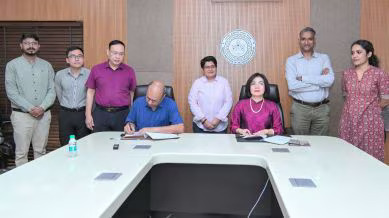IIT Kanpur, Vietnam National University forge research pact to drive AI, smart cities and innovation
By | Education | 19-Sep-2025 10:46:47

News Story
The Indian Institute of Technology
Kanpur (IIT-K) and Vietnam National University (VNU) have signed a Memorandum
of Understanding (MoU) to deepen academic and research collaboration across
cutting-edge fields, marking a significant step in India-Vietnam educational
ties.
The partnership will focus on
high-impact areas including artificial intelligence (AI) for medical
diagnostics and hospital systems tailored to Vietnam, AI-driven language
learning and education tools, infrastructure defect detection, smart city
development, material innovation with advanced carbon-carbon applications, and
drone technology for both rescue missions and agricultural productivity.
A delegation from VNU — comprising
Vice Rector Dr. Nguyen Thu Huong, Prof. Nguyen Dinh Duc, Dean of Civil
Engineering, and Dr. Tran Quoc Quan, Lecturer in Civil Engineering — visited
IIT Kanpur to explore opportunities for joint work and knowledge sharing.
Highlighting the significance of the
agreement, IIT Kanpur Director Prof. Manindra Agrawal said, “IIT Kanpur has a strong ongoing research
activity in environmental engineering, sustainable energy, smart city
development, AI, and drone technology. I hope this collaboration with VNU will
enhance capacity building and help tackle pressing challenges faced by both
India and Vietnam.”
Echoing the sentiment, Prof. Nguyen
Dinh Duc of VNU noted, “Our visit to
IIT Kanpur has been extremely fruitful. We have witnessed some of the excellent
research facilities here. IIT Kanpur’s expertise aligns with many critical
areas of research at our institution, and I look forward to strong
collaborations on both academic and research fronts.”
Meanwhile, IIT Kanpur has also admitted
five students into its BTech and BS programmes for the 2025–26 academic year
through the Olympiad route — bypassing the highly competitive JEE Advanced. All
five chose the Computer Science and Engineering (CSE) department, despite seats
being available in Mathematics and Statistics, Economic Sciences, Biological
Sciences and Bioengineering, and Chemistry.
The MoU signals a forward-looking partnership aimed at not only fostering innovation but also building solutions for some of the most urgent challenges in healthcare, infrastructure, and sustainability in Asia.